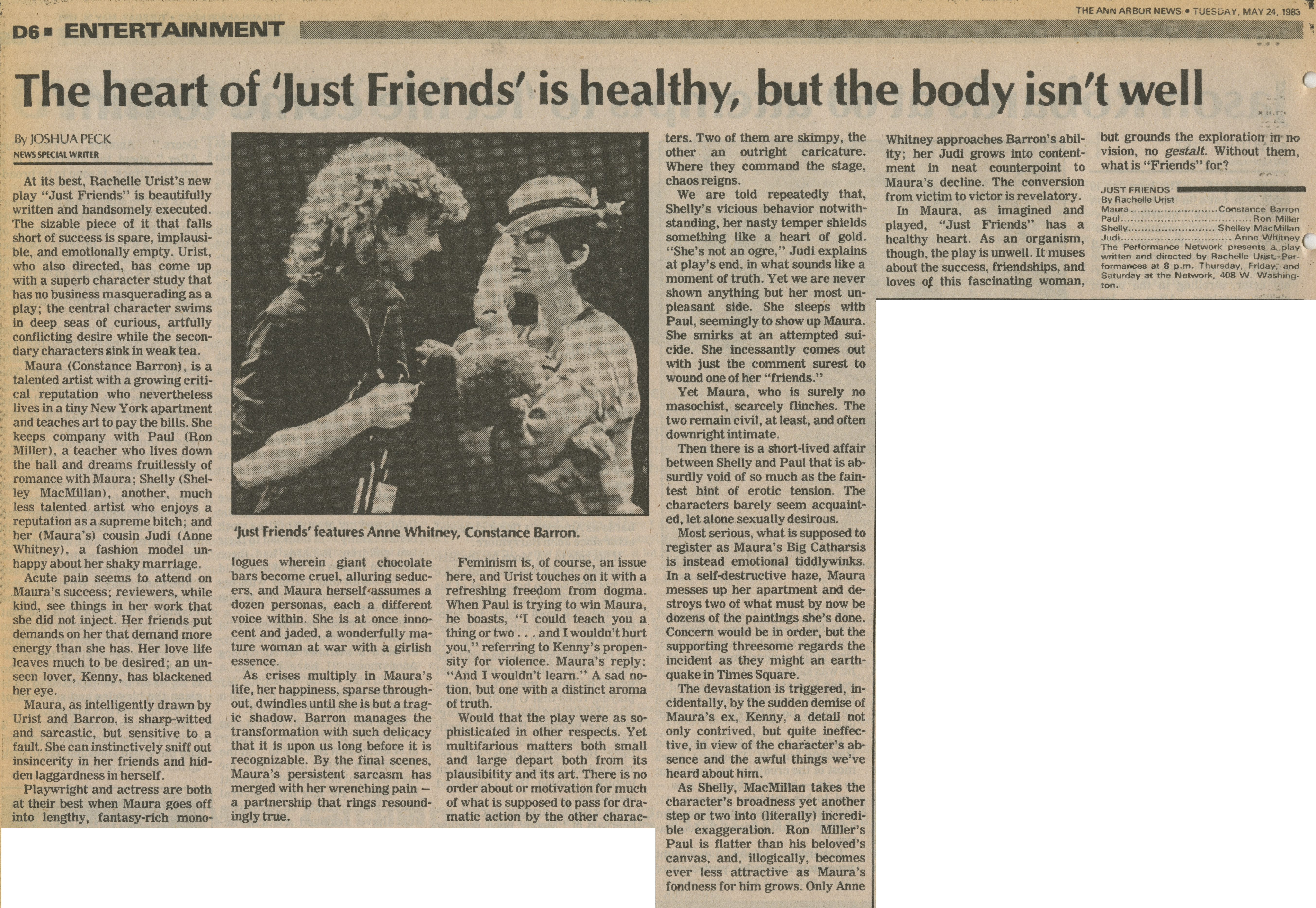The heart of 'Just Friends' is healthy, but the body isn't well

D6 ENTERTAINMENT
The heart of 'Just Friends' is healthy, but the body isn't well
By JOSHUA PECK
NEWS SPECIAL WRITER
At its best. Rachelle Urist’s new play “Just Friends” is beautifully written and handsomely executed. The sizable piece of it that falls short of success is spare, implausible, and emotionally empty. Urist, who also directed, has come up with a superb character study that has no business masquerading as a play; the central character swims in deep seas of curious, artfully conflicting desire while the secondary characters sink in weak tea.
Maura (Constance Barron), is a talented artist with a growing critical reputation who nevertheless lives in a tiny New York apartment and teaches art to pay the bills. She keeps company with Paul (Ron Miller), a teacher who lives down the hall and dreams fruitlessly of romance with Maura; Shelly (Shelley MacMillan), another, much less talented artist who enjoys a reputation as a supreme bitch; and her (Maura's) cousin Judi (Anne Whitney), a fashion model unhappy about her shaky marriage.
Acute pain seems to attend on Maura’s success; reviewers, while kind, see things in her work that she did not inject. Her friends put demands on her that demand more energy than she has. Her love life leaves much to be desired; an unseen lover, Kenny, has blackened her eye.
Maura, as intelligently drawn by Urist and Barron, is sharp-witted and sarcastic, but sensitive to a fault. She can instinctively sniff out insincerity in her friends and hidden laggardness in herself.
Playwright and actress are both at their best when Maura goes off into lengthy, fantasy-rich monologues wherein giant chocolate bars become cruel, alluring seducers, and Maura herself assumes a dozen personas, each a different voice within. She is at once innocent and jaded, a wonderfully mature woman at war with a girlish essence.
As crises multiply in Maura’s life, her happiness, sparse throughout, dwindles until she is but a tragic shadow. Barron manages the transformation with such delicacy that it is upon us long before it is recognizable. By the final scenes, Maura’s persistent sarcasm has merged with her wrenching pain - a partnership that rings resoundingly true.
Feminism is, of course, an issue here, and Urist touches on it with a refreshing freedom from dogma. When Paul is trying to win Maura, he boasts, “I could teach you a thing or two. . . and I wouldn’t hurt you,” referring to Kenny’s propensity for violence. Maura’s reply: “And I wouldn’t learn.” A sad notion, but one with a distinct aroma of truth.
Would that the play were as sophisticated in other respects. Yet multifarious matters both small and large depart both from its plausibility and its art. There is no order about or motivation for much of what is supposed to pass for dramatic action by the other characters. Two of them are skimpy, the other an outright caricature. Where they command the stage, chaos reigns.
We are told repeatedly that, Shelly’s vicious behavior notwithstanding, her nasty temper shields something like a heart of gold. “She’s not an ogre,” Judi explains at play’s end. in what sounds like a moment of truth. Yet we are never shown anything but her most unpleasant side. She sleeps with Paul, seemingly to show up Maura. She smirks at an attempted suicide. She incessantly comes out with just the comment surest to wound one of her “friends.”
Yet Maura, who is surely no masochist, scarcely flinches. The two remain civil, at least, and often downright intimate.
Then there is a short-lived affair between Shelly and Paul that is absurdly void of so much as the faintest hint of erotic tension. The characters barely seem acquainted, let alone sexually desirous.
Most serious, what is supposed to register as Maura’s Big Catharsis is instead emotional tiddlywinks. In a self-destructive haze, Maura messes up her apartment and destroys two of what must by now be dozens of the paintings she’s done. Concern would be in order, but the supporting threesome regards the incident as they might an earthquake in Times Square.
The devastation is triggered, incidentally, by the sudden demise of Maura’s ex, Kenny, a detail not only contrived, but quite ineffective, in view of the character’s absence and the awful things we’ve heard about him.
As Shelly, MacMillan takes the character’s broadness yet another step or two into (literally) incredible exaggeration. Ron Miller’s Paul is flatter than his beloved’s canvas, and, illogically, becomes ever less attractive as Maura’s fondness for him grows. Only Anne Whitney approaches Barron’s ability; her Judi grows into contentment in neat counterpoint to Maura’s decline. The conversion from victim to victor is revelatory.
In Maura, as imagined and played, “Just Friends” has a healthy heart. As an organism, though, the play is unwell. It muses about the success, friendships, and loves of this fascinating woman, but grounds the exploration in no vision, no gestalt. Without them, what is “Friends” for?
JUST FRIENDS
By Rachelle Urjst
Maura .................Constance Barron
Paul ......... Ron Miller
Shelly ........... Shelley MacMillan
Judi ............. Anne Whitney
The Performance Network presents a play written and directed by Rachelle Urist. Performances at 8 p.m. Thursday, Friday, and Saturday at the Network. 408 W. Washington.
'Just Friends' features Anne Whitney, Constance Barron.